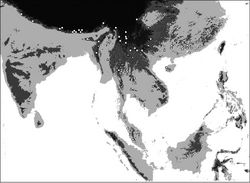Oleandra undulata
| Notice: | This page is derived from the original publication listed below, whose author(s) should always be credited. Further contributors may edit and improve the content of this page and, consequently, need to be credited as well (see page history). Any assessment of factual correctness requires a careful review of the original article as well as of subsequent contributions.
If you are uncertain whether your planned contribution is correct or not, we suggest that you use the associated discussion page instead of editing the page directly. This page should be cited as follows (rationale):
Citation formats to copy and paste
BibTeX: @article{Hovenkamp2012PhytoKeys11, RIS/ Endnote: TY - JOUR Wikipedia/ Citizendium: <ref name="Hovenkamp2012PhytoKeys11">{{Citation See also the citation download page at the journal. |
Ordo: Polypodiales
Familia: Oleandraceae
Genus: Oleandra
Name
Oleandra undulata Hovenkamp & Ho, 2012 – Wikispecies link – Pensoft Profile
- Oleandra undulata Ching, Lingnan Sci. J. 12: 565. 1933. Holttum, Rev. Fl. Mal. 2: 384. 1954. Ching, Fl. Reipubl. Popularis Sin. 2: 322. 1959. X.C.Zhang, Ching Mem. Vol.: 92. 1999. R.M.Tryon, Rhodora 102: 346, fig. 6. 2001. Polypodium undulatum Willd., Sp. Pl., ed. 4 [Willdenow] 5: 155. 1810. Type: INDIA. Tranquebar: Klein 887 (holotype: B - Willdenow 19616 -01 0).
- Oleandra pubescens Copel., Univ. Calif. Publ. Bot. 12: 397, Pl. 52A. 1931. Type: THAILAND. Eryl Smith 1072 (holotype: UC*).
Description
Rhizome short-creeping, little branching, 5–6 mm thick (3–5 when dry), not white waxy, in cross-section with many scattered sclerified strands; phyllopodia irregularly scattered, close together or distant, 2–8 cm long, roots scattered, without distinct unbranched parts. Scales persistently covering the rhizome, peltate, 3–5 ×1–1.6 mm, slightly spreading, acumen brown, with sparsely ciliate margin, apex short, wide. Fronds monomorphic; stipe 3–15 cm long, without dark coloration, articulation at 1/5–1/2 from base; lamina to 60 × 1–5.5 cm, widest in middle part, base truncate or cuneate to gradually narrowed, apex acute to narrow-acuminate, texture herbaceous, upper surface glabrous or sparsely, lower surface more densely set with usually acicular, sometimes slightly catenate hairs to c. 0.5–1.0 mm long; costa on lower surface without dark coloration, without scales. Sori close to costa or leaving a distinct 1–6 mm wide sterile zone between costa and soral zone, indusium firm, to 2 mm wide, hairy. Sporangial stalk without glands below the sporangium. Spores finely papillose and coarsely ridged, perispore baculate, outer layer not perforated.
Distribution
Burma, Laos, Thailand, China: Yunnan. Mostly below 1000 m.
Ecology
In open or deciduous forests, often disturbed; terrestrial or epilithic, rhizome subterraneous, on rocks or in crevices, mostly on granite.
Discussion
Oleandra undulata can be difficult to distinguish from Oleandra cumingii. In addition to the differences listed under that species, subterraneous growth of the rhizome may be characteristic for Oleandra undulata, but field observations are lacking for many specimens.
Taxon Treatment
- Hovenkamp, P; Ho, B; 2012: A revision of the fern genus Oleandra (Oleandraceae) in Asia PhytoKeys, 11: 1-37. doi
Images
|
